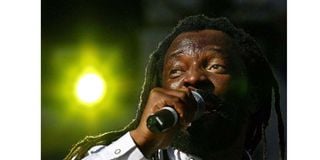The night real reggae and Lucky Dube lit up Nairobi

South African reggae singer Lucky Dube performs at the global call concert against poverty in Johannesburg, South Africa, 02 July 2005.
What you need to know:
- Kenyan politicians have a habit of hijacking popular hits to sell their agenda. In the 2002 presidential campaign, it was ‘Unbwogable’.
- In 2007, the Kibaki re-election campaign pirated ‘Injili Iendelee’, and changed it to ‘Kazi Iendelee’.
- Now the BBI referendum train has appropriated Lucky Dube’s ‘Nobody Can Stop Reggae!’
The day was December 4, 1998. Venue: Ngong Racecourse grounds. The event was dubbed: “Guinness Sunbeat Reggae Extravaganza”.
Regional giant beer maker East African Breweries Ltd had pulled out all the stops to give meaning to the word “ecstasy”. They had flown to Nairobi the world Big Five of the reggae music at the time and hired five choppers – all painted in Rastafarian colours - to airlift each of them from Jomo Kenyatta International Airport to the Ngong Racecourse.
From Jamaica came stage sensations Levi Roots, Johnny Clark, and Jah Shakar. From London was the uncontested reggae “priest”, Maxi Priest. The star attraction was our very own from down south, Lucky Dube.
I was in the estimated 20,000-plus crowd that jammed the space meant for much less. The word “Coronavirus” was then unheard-of. I was at the venue not as a journalist – for once I didn’t carry a pen and notebook – but as a great lover of reggae.
Protest movement
For me and many others, reggae isn’t merely a music genre, but food for the soul: A culture, a protest movement, and a cry for reform. Indeed, we all celebrated two years ago when the UN declared reggae music a “cultural entity worthy of protection and preservation”. In a citation read at the New York UN headquarters on November 19, 2018, reggae was celebrated for “raising discourse on issues of injustice … a vehicle for social commentary, a cathartic practice, and means of praising God”.
Nairobi on fire
Back to the night at the Ngong Racecourse, the place was a riot of reggae colours – red, yellow, and green. It was also the first time I spotted fellows with dreadlocks hanging below the waist – a reminder of Mau Mau freedom fighters.
The Jamaicans were first on the stage and they didn’t disappoint – a great reminder that reggae is, after all, their home-grown product. Then Maxi Priest jumped to the stage to send the crowds into more frenzy. Then the show-stopper Lucky Dube took the microphone. He was at his best, with give-it-all stage gymnastics, as he belted out melodies to cause a stampede that had more bouncers dropped in a lorry for crowd control.
His order of presentation was such that the crowd was worked into a frenzy with every number he belted out.
His opening song was Going back to my Roots, a message to Kenyans that he was very much at home in the land of Mau Mau and the “burning spear” (the nickname given to founding President Jomo Kenyatta when he lived in London before independence.) He followed that with Together as One, in case one missed the message in the first number. By now, the crowd was in sync, so he belted out I am a Prisoner, followed by Different Colours, One People, to remind the crowd he had come from South Africa, then newly freed from the shackles of apartheid.
Then he sang the one everybody had been waiting for: Nobody Can Stop Reggae! The crowd went wild and surged forward. Everybody wanted to dance with Lucky Dube on stage. This time it was the riot police who were called in to restore order. On acquiescing to several demands for an encore, the organisers quietly had police sneak out the king of reggae from the stage to his chopper. And off he was gone – never to return.
Predicted death
A year after the spectacular show in Nairobi, Lucky Dube wrote and produced the song: Crime and Corruption, where he asked in one of the stanzas: Do you ever worry about your car taken away from you in broad daylight down Highway 54? Do you ever worry about your wife becoming the woman in black? Do you ever worry about leaving home and coming back in a coffin with a bullet through your head?
Maybe in a premonition, Lucky Dube was singing about his own death. It happened exactly as in his song.
On the evening of October 18, 2007, he drove out from his home in Johannesburg. With him in the grey Chrysler sedan were his two teenage children he was to drop for a sleepover at his brother’s home. As he stopped at a junction to join the highway, carjackers pounced on him, pulled out the boy seated at the front, and aimed the gun on the reggae star. He slumped dead on the steering wheel as he crashed into a tree trying to escape with bullet wounds.
The highway robbers he once sang about finally stopped him in his tracks. But they couldn’t stop reggae!





